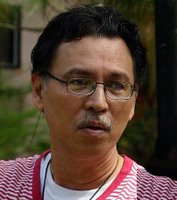Cagayan de Oro Press Club marks milestones for 55th Anniversary

By MIKE BAÑOS
The Cagayan de Oro Press Club, Inc. (COPC) turns 55 today. One of the oldest in the country, it is also one of the few with a truly professional organization in the sense that it has a working board of directors, assets which allow it to undertake projects and employ a full-time staff, albeit on a small scale, and it is a respected member of civil society which plays an active role in the city and the region's affairs.
Today's celebration will be particularly significant because of a number of firsts the COPC has accomplished with today's anniversary, particularly in relation to its training module on Responsible and Independent Journalism.
This is a program undertaken over two years ago under the administration of past president Herbie Gomez with financial and technical assistance from the Australian government to professionalize the local media, particularly COPC members, and provide them with the tools, knowledge, skills and support needed to fight corruption in the city and the region. Its ultimate goal is to set up a local counterpart to the Philippine Center for Investigative Journalism.
First, this is the first time the COPC has undertaken such a training with a local educational institution, which in our case is the South East Asian Rural Social Leadership Institute, better known to locals as Searsolin, a division of the College of Agriculture of Xavier University (Ateneo de Cagayan).
Searsolin is a Catholic, Jesuit, Filipino and Asian institution. It is dedicated to the formation of socially-committed and competent leaders committed to poverty alleviation and holistic human development within the context of diverse cultural and religious traditions in Asia, Pacific and Africa. It aspires to attain a just social order where respect for human dignity, deference of various religious beliefs, equitable distribution of wealth and care for the bounty of the earth prevail. The training programs are geared towards understanding poverty, what creates and perpetuates it, and acquiring skills necessary to alleviate it and benefit the poor.
It's also the first time the COPC has worked together with Searsolin to train international students. During the second of our four-part program, we had Ismail Abid Aziz of Malaysia join our first batch of trainees who are mostly from Misamis Oriental's Provincial Communicators Association (Procoma) headed by Cedric Dayta of Luga-it, and now we had our friends from Indo-China and India whom we shall mention here for posterity's sake: Fr. Michael Raj from India, Nguyen Van Hoang and Nguyen Thi Hay Yen of Vietnam, Francis Cympanel and Theresa Min Min Myat of Myanmar (formerly Burma), Meng Chhay of Cambodia and Phouva Manipakon of Laos (I hope I did not mix up your countries!)
In behalf of the participants and training staff of our first batch, may I extend our thanks and appreciation to the Searsolin staff under the able management of Director Dr. Anselmo "Boy" B. Mercado, Ed.D. for their hospitality and expertise which helped make our first training a memorable training experience. We also wish to cite Training Officer Liza Gonzales and Lito Tagalog from the Library whose invaluable assistance and support were crucial in the COPC leanings from this 'first time.' Daghang Salamat!
May I also take this occasion to salute past president Herbie Gomez (sa way pabor-pabor) for his drive and vision in bringing to fruition this local version of the PCIJ. I know you sometimes lose heart when people don't perform as expected and obstacles seem to rise up on every occasion but this is a good thing we've done here and you should be proud you were instrumental in bringing it to life. Maybe JACNet wil have its own building someday which will house its operations and we can call it the Herbie Gomez Center for Investigative Journalism. Puede na bisan dili posthumous ha?
In addition to our training module, we've also revived our Journalists Against Corruption Network (JACNet) initiative, re-organizing the JACNet Editorial Board and bringing our JACNet Website back up in cyberspace with the help of my fellow director Comrade Ben Balce. Earlier this week, the Board approved the business plan which shall hopefully set this particular component of our project on the road to self-sufficiency, long-term stability and sustainability.
Kudos too is in order for Director Terry Betonio for successfully reviving the COPC Newsletter, which we shall soon set on the same road of self-sustenance with a similar business plan.
However, much remains to be done. The financial planning and execution of the COPC needs a lot of hard work to set it straight, and a long-term business plan has yet to be formulated. This, together with the ongoing membership revamp, will be the pillars upon which the foundation of the COPC's success in the long run would be anchored upon. With Director Ruffy Magbanua and Joey Nacalaban taking care of business at this end, members have a lot of confidence we shall prevail.
Our COPC Code of Ethics will also need to be updated. Following the mandate of the Ethics Committee as spelled out in our charter, we have researched the Codes of Ethics of respectable media aggrupations in the country, as well as those without in the United States, Japan and Australia, and have come out with five key provisions which are not included in our present Code of Ethics. This we shall do during our next general assembly this December.
Not the least, may I also urge all COPC members in behalf of the Board to accomplish their personal data sheet in the office. This data will not only serve to provide you with an updated press card but even more important, be the basis for approval of a personal life insurance policy which considering the state of journalists in the country today, is a very welcome initiative.
Happy Anniversary to All! As the famous song by the Carpenters goes, "We've only just begun…"
comments to mike_banos@walla.com
Home




